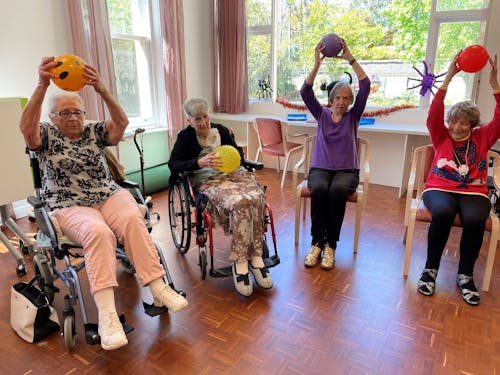It’s Becoming Harder To Take Care of Family
As the population ages, more and more families are finding themselves facing the challenge of caring for elderly loved ones. This trend is due to a variety of factors, including increased life expectancy, the rising cost of long-term care, and changing family dynamics.
Long-term Care Is Breaking The Bank

One of the primary reasons that more people are taking care of elderly family members is the increasing cost of long-term care. According to the Genworth Cost of Care Survey, the average cost of a semi-private room in a nursing home in the United States is over $90,000 per year. Many families simply cannot afford this cost, and as a result, they are turning to alternative care options, such as in-home care provided by family members.
Change In Family Dynamics
Another factor contributing to the trend of more people caring for elderly family members is changing family dynamics. In the past, it was more common for families to live in close proximity to one another, which made it easier to provide care for elderly relatives. However, in recent years, families have become more geographically dispersed, making it more difficult to provide care from a distance.
Increase Life Expectancy
Finally, increasing life expectancy is also contributing to the trend of more people caring for elderly family members. As people live longer, they are more likely to experience chronic health conditions and disabilities that require long-term care. This, in turn, puts a greater burden on family members to provide care.
The Burden Is Heavy
Caring for an elderly family member can be a rewarding experience, but it can also be challenging and stressful. Many caregivers must balance their caregiving responsibilities with work and other obligations, which can lead to burnout and other negative consequences. In addition, providing care for an elderly family member often requires specialized knowledge and skills, such as administering medication and managing chronic health conditions.
Fortunately, there are resources available to help family caregivers. Many community organizations offer support groups, respite care, and other services to help caregivers cope with the demands of caregiving.
Can The Government Help?

More and more families are finding themselves facing the challenge of caring for elderly loved ones. This can be a difficult and time-consuming task, and many families struggle to balance it with work and other responsibilities. One question that often arises is whether the government will pay family members to take care of their elderly relatives.
The answer is yes, in some cases. In the United States, several programs provide financial assistance to family caregivers. Both federal and state governments administer these programs, and eligibility requirements vary depending on the program.
Medicaid
One of the most well-known programs is Medicaid, which is a joint federal and state program that provides healthcare coverage to low-income individuals and families. In some states, Medicaid will pay family members to provide care to elderly relatives who would otherwise need to be in a nursing home or other institutional setting. This is known as the Medicaid Home and Community-Based Services (HCBS) program.
To be eligible for the Medicaid HCBS program, the elderly person must meet the state’s eligibility requirements for Medicaid and must require a certain level of care, typically equivalent to that provided in a nursing home. The family member providing care must also meet certain eligibility requirements, such as completing a training program and passing a criminal background check.
VA
Another program that provides financial assistance to family caregivers is the Veterans Affairs (VA) Program of Comprehensive Assistance for Family Caregivers. This program provides a monthly stipend to family caregivers of eligible veterans who have a serious injury incurred in the line of duty on or after September 11, 2001. The stipend is intended to help the caregiver with expenses related to providing care, such as transportation and home modifications.
To be eligible for the VA program, the veteran must have a serious injury that requires assistance with activities of daily living, and the caregiver must be providing at least 30 hours of care per week. The caregiver must also complete a training program and pass a background check.
It’s worth noting that these programs are not available in all states and that eligibility requirements vary. In addition, the amount of financial assistance provided may not be enough to cover all of the costs associated with providing care, particularly if the caregiver needs to reduce their work hours or leave their job entirely to provide care.
If you are considering becoming a paid caregiver for an elderly family member, it’s important to research the programs available in your state and carefully consider the financial and personal implications of providing care. While it can be a rewarding experience, caregiving can also be stressful and time-consuming, and it’s important to have a plan in place to ensure that you and your loved one receive the support you need.
Are There Other Financially Sound Ways To Do This?
While there are government programs such as Medicaid and the Veterans Affairs (VA) program that provide financial assistance to family caregivers, there are also other ways to care for an elderly family member without breaking the bank. We mentioned a few of them earlier in the article, but let’s take a closer look at some cheaper ways to take care of your elderly loved ones.
- Utilize Community Resources: There are a variety of community resources available to help family caregivers. Many communities have senior centers that offer programs and activities for older adults, as well as support groups for caregivers. You can also check with your local Area Agency on Aging to find out about other resources in your community, such as home-delivered meals or transportation services.
- Share Caregiving Responsibilities: Caring for an elderly family member can be a full-time job, and it can be overwhelming for one person to take on all of the responsibilities. Consider enlisting the help of other family members, friends, or neighbors to share caregiving responsibilities. This can help to reduce the burden on any one person and also provide additional social support for the elderly family member.
- Use Technology: There are a variety of technology tools available to help family caregivers provide care to their loved ones. For example, remote monitoring systems can help caregivers keep an eye on their loved ones’ health and well-being, while video chat apps can help them stay connected even when they can’t be together in person.
- Look for Discounted Services: Many businesses and service providers offer discounts to senior citizens and their caregivers. For example, some pharmacies offer discounts on prescription medications for older adults, while some home health care agencies offer discounted rates for certain services. It’s worth doing some research to find out which providers in your area offer discounts or other cost-saving options.
- DIY Home Modifications: Making modifications to the home can help to make it safer and more comfortable for an elderly family member. While professional home modifications can be expensive, many simple and affordable modifications can be done by family members themselves. For example, installing grab bars in the bathroom or adding non-slip mats to the shower can help to prevent falls.
It Can Be Done

There are no true ideal situations when it comes to caring for an elderly family member. Most of the time, it can be challenging, but it doesn’t have to be expensive. By utilizing community resources, sharing caregiving responsibilities, using technology, looking for discounted services, and making DIY home modifications, family caregivers can provide quality care to their loved ones without breaking the bank. By taking some time to look into Medicaid and the VA, you may be able to get some monetary assistance to help. Remember that this is family, and by just adding a little creativity and resourcefulness, caregiving can be a fulfilling and rewarding experience for all involved.








